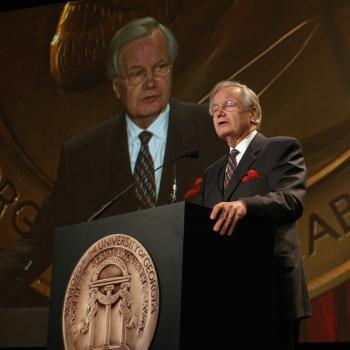
Can faith change a person for the better? I’m convinced it can, and I need look only as far as my one-time husband for proof.
Faith has changed the lives of countless Christians in the last 2,000 years, including a man I once knew. We met in college, and I thought he was funny, interesting and intelligent, as well as good looking.
We were both products of deeply religious middle-class families and shared many of the same interests and values (or so I thought). I fell head-over-heels in love. We married and had our first child in little over a year.
Our marriage seemed good in the beginning despite one area of conflict. He was decidedly more conservative in his Christian beliefs than I was in mine, but we pushed that difference of opinion to the back burner. Then one day, we got into an argument, and he told me I was going to hell if I did not join his conservative church.
That comment nearly wrecked our marriage. I had been trying to appease him by attending his church one week and mine the next, but he would not reciprocate. He went to his church or no church, no doubt because he “knew” that hell awaited him if he attended a Methodist church even once.
After his comment about hell, I returned to my own church full-time and took our daughter with me. There was absolutely no way I would attend a church that consigned me to hell because I was Methodist. It was an insult to me and other Christians and denominations.
We had several arguments about our daughter attending a Methodist church. But as my husband became busier with school and then his job, he gave up church altogether.
I said nothing. I had not intended to drive him away from church, but decided it was his decision, not mine. And I wanted no more arguments over church or religion.
A Family’s Descent into Hell
We welcomed another child in the following years, but deeper cracks began to appear in our marriage. The funny and charming young man I married was slowly becoming a heavy drinker who raged at me when he drank. The idea of joining Alcoholics Anonymous infuriated him because in his eyes I was the problem, not him.
I reached the point where I no longer knew or understood him and really didn’t care. I had two children to raise, and he had a business that consumed his time. We lived separate lives.
The drinking was hard on all of us, but the situation worsened when my husband began to suffer mood swings. They took him from the highest highs to the lowest lows.
I never knew which version of him would walk through the door – and sometimes he didn’t walk through the door for days on end. Those were the most peaceful days I had, and I came to cherish them.
Battling Demons
Divorce was inevitable if I wanted the children to have a better childhood. Following the divorce, my ex continued his downward spiral until he at long last sought treatment and was diagnosed with alcoholism, which had been obvious to everyone but him, and schizoaffective disorder, which didn’t surprise me in the least.
The children and I moved nearer to my parents, which placed them some 25 miles away from their dad. It was close enough for them to see him regularly when he was sober. As it was, they saw him sporadically as he continued to battle the demons one encounters when you’re an alcoholic with a mental illness.
A.A. & Faith
I never knew the details of my ex-husband’s life after the divorce, though I was aware of general events because of the children. At one point, I learned that he had been in and out of treatment centers for a year or more and had lost his business.
Years passed, and he slowly pulled himself together enough to earn a living once again, get married and start a new family.
Alcoholics Anonymous played a significant role in his recovery because, I think, it helped him rediscover God.
“The principle of faith is an essential spiritual principle of Alcoholics Anonymous (A.A.),” according to the organization. “It is the third spiritual principle, along with the first two principles of honesty and hope. It cements the foundation of functional recovery from addiction,” the organization said.
“Ultimately, faith comes down to having total confidence, belief, and trust in a Higher Power or God as you may understand Him. Our faith grows when we take action and see the positive evidence of faith in all activities around us.”
A.A. has described itself as a spiritual program that isn’t associated with any religion or denomination. “Many members believe in a god, and we have members that come from and practice all sorts of religions, but also many are atheist or agnostic….
“Those who believe in some sort of divinity often find it useful to incorporate the program into their religious practices and vice versa.” Perhaps that’s how my children’s father changed so dramatically.
Piecing Relationships Together
My interactions with my ex were limited by choice, but the girls talked about him quite a bit as teenagers. They said he spoke of God frequently — how God helped him become sober, how God helped him remain sober and how God guided his efforts to become a better father. And he even talked to the girls about battling the demons associated with his mental illness, which astounded me.
He had come a long way since he insisted he didn’t have a problem.
Our older daughter welcomed the changes with open arms, but our younger one – who had never had a relationship with him – did not. He had to prove himself in her eyes, and he eventually did.
I stayed out of the situation. I was skeptical about this recovery business because I didn’t think a person could change as much as he pretended. But my daughters had to develop their relationships with him without interference from me, and they did.
It was fortunate that the healing occurred because one August day in 2002, their father died of a sudden massive heart attack. His mind and spirit had healed from the ravages of excessive drinking, but his body had not.
Aftermath
His widow invited me to attend the receiving of friends and the funeral. It was those events that convinced me that God had profoundly changed him, as I heard one story after another about the wonderful man he had become.
The husband and father that his widow and her children mourned was far removed from the man I once knew. People who had known him for many years marveled at the change in him and those who met him later in life called him a godly man who was active in his church, his son’s Boy Scout troop, the city choral society, a civic club or whatever else. It sounded as if he was trying to make up for lost time.
Yes, people say positive things about the deceased at funerals, but the stories about my exe consistently described a man of God who loved his family and wanted to have a positive influence on his community. The man I divorced so many years ago was not that man.
Why go into these details? Because I want to reinforce the fact that God can work miracles if we let him.
And by the way, my ex — who would not set foot in a Methodist church — became an Episcopalian in later life. In fact, his funeral was held in the lovely Episcopalian church where he had been working the day he died. How ironic!
Learn more about Faith & Alcoholism
Check out these articles for more information:
- “Faith-based Treatment” on the “Alcohol Rehab Guide” website
- “Spirituality within Addiction and Recovery” on Patheos
- “Addiction and the Church” on Patheos
- “The Role of Supports, Spirituality, Religiousness, Life Meaning and Affiliation with 12-Step Fellowships” on the “Library of Medicine” website.













